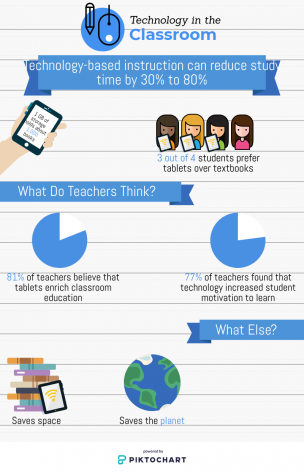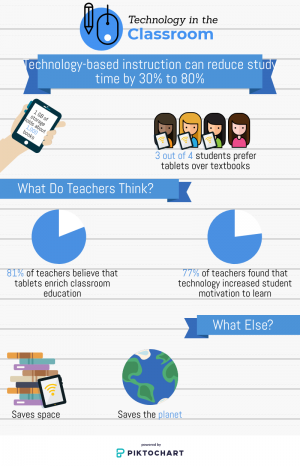Books, bytes, and beyond
May 30, 2018
Call me an old-fashioned book nerd, but I don’t have a Kindle. Or a Nook.
But I do have a shelf full of books at home. I enjoy walking to the library. I enjoy the thrill of opening a new book and the satisfaction of closing it when I’m done. I used to read to my grandma, and through books I’ve bonded with friends and made new ones. I sometimes read at restaurants. Am I the only person that does this?
Yes? No? Maybe so?
But today, in the age where technology seems like it’s taking over the world, I’m seeing more e-readers pop up. It’s not a bad thing, but I’d like to see more tangible books out there. Now, some argue that e-books save the environment, and they do, to a certain degree. Even though paper takes up the most space in landfills, e-waste or electronic waste is much more harmful to the environment. Only 2% of municipal solid waste is e-waste, containing toxic metals, like lead and mercury. In the United States, approximately only 20% of e-waste is recycled, while 70% of that recycled e-waste is shipped to China. There, people separate valuable metals from everything else, using acids and fire without proper protection. These people, including children, inhale fumes. Children are more susceptible to neurological, digestive, and immune disorders caused by exposure to toxic metals because they need more air, food, and water than adults do.
Consider the carbon footprint of paper books and e-books. A product’s carbon footprint is how much carbon dioxide is released into the atmosphere during its lifetime. The carbon footprint of a traditional book is 7.5kg, while for an e-reader it’s 168kg in total. iPads have a carbon footprint of 130kg CO2eq. Electronics use energy and require more fossil fuels the more they are used, causing the need for more fossil fuels to be mined. This negatively affects the environment. Even though manufacturing fewer paper books saves trees and reduces some CO2 emissions, the industry manufacturing e-readers emits CO2 into the atmosphere. Carbon dioxide, a greenhouse gas, stays in the atmosphere and traps heat, warming the earth, contributing to global warming and climate change.
E-books don’t just pose a threat to the environment. They also interfere with human health and child development. Neurotherapist Dr. Mari K. Swingle deals with society, technology, and its health effects. She is the author of i-Minds: How Cell Phones, Computers, Gaming and Social Media are Changing Our Brains, Our Behavior, and the Evolution of Our Species. It explains how people are constantly using technology and how it impacts our society. Dr. Swingle has several articles on the subject of humans and technology. She writes that using technology and electronics for long periods of time can cause disorders such as anxiety, depression, and ADHD. It can change how humans communicate with each other. Children are susceptible to development issues when glued to a screen for so long.
On the bus for this year’s choir trip, my roommate was constantly on her e-reader. She had so many books stored, some she even got for free. Students are constantly on their phones or tablets, reading books and playing games. Technology is also being used more frequently in schools, as we implemented the one-to-one laptop program this year.
Three studies were conducted using college students, and even though students read faster and preferred to read on screens, they understood the information better when reading print books. Swingle mentions that excessive use of technology can cause the brain to rewire itself during childhood development and cause behavioral issues. People are used to focusing on a screen, so there is a lack of connection and communication.
Excessive time on electronics can cause dryness of the eyes and blurred vision. Electronic screens are backlit, giving off a blue light called high-energy visible (HEV) light. Increased exposure to HEV light restrains melatonin, a sleep hormone, messing up sleep schedules. In a survey of 9,700 of American adults, 43% said they spend a significant amount of time on their e-reader.
If you’re concerned about the effects of books and e-readers, recycle paper books for your library’s used book sale. You can also borrow audiobooks from the library. Try limiting the amount of time you spend on your e-reader. Your eyes and brain will thank you. So will Mother Earth.








